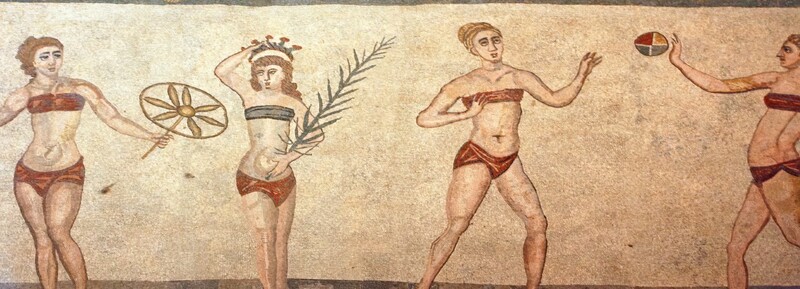
Welcome to Cynisca, an extensive collection of sources for women’s engagement with ancient Greek sports. The name pays homage to Cynisca of Sparta, a princess who went down in history as the very first woman ever to win at the Olympic Games: in the early years of the fourth century BCE her four-horse chariot twice emerged victorious in one of the most prestigious of all ancient Greek contests. Yet, with Cynisca’s pioneering fame outshining everyone else’s, even many experts in the field are unaware that women who engaged in ancient Greek sports are far more numerous than one might think at first sight.
To be sure, in many ways women were excluded from agonistics, the realm of organized athletic competitions, which was of paramount importance for ancient Greek society and tended to be considered a typically male activity. All through antiquity, these immensely popular competitions were not only closely intertwined with religious practices, but they also had notable implications in politics and the economy. Successful athletes earned great fame and honor by displaying what was considered their manly vigor and excellence in front of large audiences at international festivals. Nevertheless, a large and diverse body of historical evidence attests to the involvement of girls and women in the agonistic world from the Archaic period to Late Antiquity. This geographically and chronologically disparate record is collected here for the first time to make it more accessible.
Ranging from mere lists of victors at a particular contest over official honors for female organizers to victory odes by famous poets, a substantial number of the texts paint a vivid picture of the involvement of women and girls in the agonistic sphere. Beyond the realm of practice, and sometimes in stark contrast to it, sources discussing such activities by women – whether positively or negatively – have also been included. In offering convenient access to all of this evidence here, we aim to stimulate further engagement with this fascinating topic by as many people as possible, whether students, history enthusiasts, or scholars.
What the database offers
The Cynisca database is first and foremost a collection of sources offering the original Greek or Latin texts with English translations accompanied by brief explanatory notes. We also offer a general bibliography on women and sports in the ancient Greek world, and many entries contain additional references to specific studies relevant to them. Whenever they were available, we have used existing translations that are in the public domain, but several texts have here been translated into English for the first time. Our own translations do not strive for literary merit but rather aim to reflect the ancient text as closely as idiom and readability allow.
We have striven to include as many texts as possible that provide specific information on ancient Greek women’s sports, and we intend to add further sources in the future; because of technical reasons and copyright issues the plentiful archaeological evidence could not be included. The selected texts concern the practice and perception of women’s involvement in sports, especially though not exclusively within the framework of official contests: this primarily includes training and competing, the organization of contests, victory celebration, and discussions as to whether and how women should engage in physical exercise. Sources for female gymnasion presidents (gymnasiarchs) have not been included since they can now be found in the GymnAsia database.
How to use the database
The aim of the database is simply to make the sources available for anyone who wishes to study the topic, so that the structure has been kept deliberately basic. Each entry title contains the source reference and a brief description of its topic. Browsing through the list of all sources is just one of the many available options for exploring the database.
Each source has been added to one of the following collections:
- Acrobatics: sources describing acrobatic performances by women
- Agonothesia (Organization): attestations of women as organizers of Greek athletic contests
- Contests: sources that contain specific information about contests for women or girls
- Discourse: ancient authors commenting on women’s engagement in athletics
- Medicine: extracts from medical texts discussing health benefits and risks of physical exercise for girls and women
- Mythology: women’s sports in Greek heroic myths
- Spectators: information on female spectators
- Uncertain cases: some well-known sources in which it is unclear whether they concern sports and/or women
- Victresses: women who have won a contest; in practice this is the same as attested participants since the preserved sources only inform us about successful women
Users should note that each source is part of only one collection, even if many of them might also fit in other collections. For instance, many sources in the Agonothesia and Victresses collections will also mention contests. In a similar vein, all sources that from a modern perspective belong to the realm of myth are in the category Mythology, but it is of course likely that they represent contemporary discourses of their author’s times.
When looking for more specific topics, one can browse the list of tags: these include people, festivals, disciplines and many more kinds of keywords listing central aspects of the individual texts.
Besides browsing there are also several search options: one can either search tags or perform a full-text search for any word in the database. With the advanced search the results can be narrowed down in many ways, e.g. by author (“source”) or genre (“type”).
Names of ancient authors are written in the Latin form (e.g. Ovidius, Plutarchus). Editions of inscriptions are abbreviated according to the list of the Association Internationale d’Épigraphie Grecque et Latine, which can be found here.
For Background information we recommend the Mannheim Ancient History Department’s website Sport und Spiele im antiken Griechenland (in German) or the Ancient Olympics website from the University of Leuven (in English, Chinese, Arabic and Dutch). Those who want to explore the topic more in depth are referred to our bibliography and to the Nikephoros Bibliography of Sport in Antiquity.